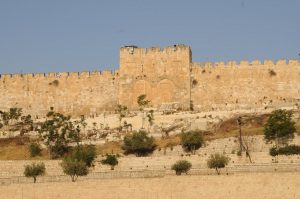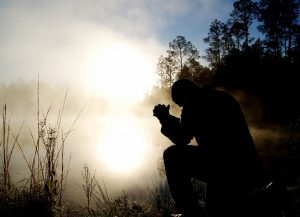
“For I know the plans I have for you.” Jeremiah 29:11 NLT
Called into ministry before his birth, the priest and prophet Jeremiah soon became known as “the weeping prophet.” He had plenty of reasons to weep during his forty years of ministry. Israel was deep into idolatry and immorality, and its kings successively turned away from the Lord.
Despite Jeremiah’s many warnings of God’s impending judgment, often resulting in physical harm to him or outright threat of death, no one listened, and Israel paid a costly price. Two thousand years later, Israel is still waiting for God’s blessing, and Jeremiah’s prophecy continues to be fulfilled.
Israel in Rebellion
Long before Jeremiah was born, Israel fell into shameless idolatry. King Ahaz set up a system of child sacrifice to the god Molech just outside Jerusalem. His son, Hezekiah, tried to end the practice (Isaiah 36:7), but when Hezekiah’s son, Ahaz’s grandson, Manasseh, came into power, child sacrifice was reimplemented (Jeremiah, 7:31; 19:5; 32:35).
This was the state of Israel in Jeremiah’s time. And these unholy practices, in addition to out-of-control idolatry including to the so-called “queen of heaven (7:18; 44:19),” adultery, and tyranny, had long been the norm when Jeremiah was born. Nevertheless, he was obedient and followed God’s calling.
Jeremiah was in ministry for nearly five decades, spanning the reigns of five different kings: Josiah, Jehoahaz, Jehoiakim, Jehoiachin (also called Jeconiah, whose descendant was eventually Joseph, Jesus’ earthly father), and Zedekiah (640-586 B.C.). These were the last five kings who reigned in Judah on the throne of David, and no one has reigned there since.
Jeremiah’s Warnings
Jeremiah repeatedly warned Israel to repent and avoid God’s righteous judgment. He repeatedly prophesied Jerusalem’s siege by the Babylonians (Jeremiah 26). He even wrote God’s warning on a scroll that his scribe, Baruch, read aloud before the Temple court where the general public assembled. After hearing Baruch speak, the king’s scribes read the scroll to King Jehoiakim, who was not very pleased. He burned the scroll and tried to seize Jeremiah and Baruch. He was unsuccessful, however. The scribes had told them to hide beforehand, and God protected them (36:11-26).
God then told Jeremiah to write a second scroll, again calling for repentance and warning of Jerusalem’s impending siege. But a new prophecy was added—one just for the king.
“Therefore, thus says the LORD concerning Jehoiakim king of Judah: ‘He shall have no one to sit on the throne of David, and his dead body shall be cast out to the heat of the day and the frost of the night. I will punish him, his family, and his servants for their iniquity; and I will bring on them, on the inhabitants of Jerusalem, and on the men of Judah all the doom that I have pronounced against them, but they did not heed.’” (vs30-31 NKJ)
With one statement, Jeremiah prophesied Jerusalem’s destruction, Jehoiakim’s death, and the end of his family line on the throne of David. And it all came to pass.

Nebuchadnezzar Attacks
Jehoiakim naturally scoffed at Jeremiah’s prophecy. The Babylonians had already attacked Jerusalem once before in 605 B.C., but they did not destroy the Temple. They only took captives, people like Daniel and his friends (Daniel 1). Jehoiakim felt confident that would be the worst if there were another attack.
The people’s welfare was not his concern. Jehoiakim was only concerned with power. He routinely changed alliances between Babylon and Egypt, going back and forth with whoever was the more powerful at any given time. But once, while he was pivoting toward Egypt, King Nebuchadnezzar attacked in 586 B.C.
King Jehoiakim became Nebuchadnezzar’s representative in Judah for three years until he rebelled against Babylon, relying on Egypt as an ally. But the Lord sent the Chaldeans, Syrians, Moabites, and Ammonites to invade Judah and destroy it (2 Kings 24:2).
Jehoiakim died soon after, and his son, Jehoiachin (Jeconiah), became king. He reigned for only three months when Nebuchadnezzar overthrew him. His removal from power fulfilled Jeremiah’s prophecy that Jehoiakim’s descendants would never sit on David’s throne again (2 Chronicles 36;8-9; 2 Kings 24:8). Nebuchadnezzar then took Jehoiachin captive along with thousands of others, including the prophet Ezekiel, and placed Mattaniah on the throne, changing his name to Zedekiah (2 Kings 24:17).
Nine years later, Zedekiah rebelled against Babylon, causing Nebuchadnezzar to invade Jerusalem again. Jeremiah urged the king to surrender. Surrendering would lessen the damage the Babylonians would inflict. But Zedekiah was afraid of what the exiled Jews would do to him (Jeremiah 38:19) when they saw him. Instead, the king and his army fled. They were captured by the Chaldeans and turned over to Nebuchadnezzar (39:4-5).
Nebuchadnezzar pillaged the Temple and burned it to the ground (2 Kings 25:9) on the ninth day of the Jewish month of Av. He then forced Zedekiah to watch the death of his sons before he gouged out Zedekiah’s eyes, bound him in bronze ankle chains, and forced him to march to Babylon (Jeremiah 39:6-7).

Jeremiah’s Prophecy of Hope
Jeremiah continued to prophesy all during this time, urging the people to repent. His messages did not always go over very well.
Twice he was imprisoned: once on the assumption he was defecting to the Chaldeans (Jeremiah 37:15), and once for encouraging people to defect to the Chaldeans in order to diminish Jerusalem’s destruction (v2-6). The people also sought his death for prophesying, but the Babylonian governor of Judah used his influence to protect Jeremiah (Jeremiah 26). And the chief governor of the Temple, a priest named Pashhur, had him put in the stocks for 24 hours for prophesying.
Jeremiah was not a very popular man, but he did not give up on Israel. He believed and prophesied Jerusalem would completely burn, many of its people killed, and most survivors taken captive by the Babylonians (Jeremiah 38:17-18), but God would allow them to return after 70 years. So he encouraged them to flourish in captivity and be ready to return.
“Build houses and dwell in them; plant gardens and eat their fruit. Take wives and beget sons and daughters; take wives for your sons and give your daughters to husbands so they may bear sons and daughters—that you may be increased there and not diminished. And seek the peace of the city where I have caused you to be carried away captive and pray to the LORD for it; for in its peace, you will have peace…For thus says the LORD: After seventy years are completed at Babylon, I will visit you and perform My good word toward you and cause you to return to this place. For I know the thoughts that I think toward you, says the LORD, thoughts of peace and not of evil, to give you a future and a hope.” (Jeremiah 29:5-11 NKJ)
And God fulfilled His inspiring promise and prophecy precisely 70 years later.
The Exiles’ Return
When the time came for the Jews’ return home, God caused King Cyrus of Persia, an empire that took power from the Babylonians following Nebuchadnezzar’s madness (Daniel 4:28-33), to decree that the Israelites could return to Jerusalem and rebuild the Temple in 539 B.C.
As a point of reference, Zerubbabel and Joshua led the first return to rebuild the Temple (Ezra 1-6), Ezra led the second return in 458 B.C. (Ezra 7-10), and Nehemiah led the third return to rebuild Jerusalem’s walls (445 B.C.). The book of Esther chronicles the events that occurred to the Jews who were left behind in Persia.
The Jews eventually rebuilt the Second Temple. They were allowed to re-establish their calendar with their feasts and offerings, and God brought peace to the land.
“I, Myself, will gather the remnant of My flock out of all the countries where I have driven them and will bring them back to their pasture, where they will be fruitful and increase in number. I will place shepherds over them who will tend them, and they will no longer be afraid or terrified, nor will any be missing.” (Jeremiah 23:3-4 NKJ)
Unfortunately, 420 years later, the Romans invaded Jerusalem and utterly destroyed the Second Temple on the exact same day the First Temple was destroyed—the ninth of Av. And the Jewish people continue to wait for a Third Temple to be built.
Until then, the Jews annually honor Tisha B’Av (Av 9) as the saddest day on the Jewish calendar. Both temples were destroyed on this day, and the Bar Kochba (Maccabee) Rebellion was crushed, causing the first Jewish exile in 133 A.D. They were exiled again from England in 1290 A.D. and Spain in 1492 A.D., and Germany declared war on Russia to kick off WWI in 1914. All on Av 9.
Jeremiah’s Final Days
As for Jeremiah, he was forced against his will to flee with a remnant of poor Jews to Egypt (Jeremiah 43-44), where he continued to prophesy, warning the people God would punish them for going to Egypt. He warned that God would hand Egypt over Babylon, and He did. God also handed over Philistia, Moab, Ammon, Edom, Damascus, Elam, and most of the Middle East. Jeremiah also prophesied that Babylon would one day fall too, which it did.
Rabbinic literature tells of Jeremiah being taken to Babylon after the Egyptian invasion. Scholars theorize he finished his book there in 561 B.C. as former king Jehoiachin was released from prison (Jeremiah 52:31-34), but there is not sufficient evidence of it.
Despite all the violence taken against him for speaking God’s messages for over 40 years, it is believed Jeremiah lived to approximately 85-90 years old. And all those years, Jeremiah wept for Israel.
He had good reason for it.

The Branch of Righteousness
Jeremiah did not only give warnings to the Jewish people. He also gave them hope.
Following the death of Jehoiakim, Jeremiah prophesied that God would raise up “a Branch of righteousness,” and the Branch would sit on David’s throne forever.
“’ Behold, the days are coming,’ says the LORD, that I will raise to David a Branch of righteousness. A King shall reign and prosper and execute judgment and righteousness in the earth. In His days, Judah will be saved, and Israel will dwell safely. Now, this is His name by which He will be called: THE LORD OUR RIGHTEOUSNESS.” (Jeremiah 23:5-6 NKJ)
We know this Branch to be Jesus Christ. As the rightful heir of David’s throne, Jesus brought salvation to all the people. Though He did not come as a military warrior like the kings of Judah (as the Jews expected), He came to us gently, with love, and died for us all so that we might escape the penalty of sin and have eternal life. And we know He will one day return to claim His bride, the church, and destroy sin forever.
Jeremiah’s prophecies continue to be fulfilled even now. In these last days, God promises to gather the Jews in Israel again (Jeremiah 33:3,6-18), and more Jews are returning to live in Israel than ever before. And both apostles Paul and John later prophesied (2 Thessalonians 2:3-4 and Revelation 13:14-15, respectively) that a third temple will be built, which is already being planned. The fulfillment of both prophecies will usher in Jesus’ triumphant return.
On this ninth day of Av (July 17), may we remember God’s power and promises as we eagerly wait to see Jesus again.
